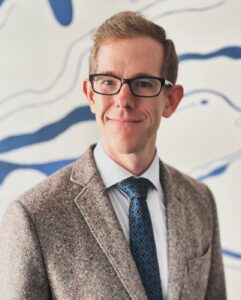March 28, 2025
The OI Welcomes a New Editor of Books

Scott Heerman
The Omohundro Institute of Early American History & Culture is excited to announce the appointment of Scott Heerman as Editor of Books at the OI and Associate Professor in the Department of History at William & Mary effective August 10, 2025. Heerman will join the OI Books team as Interim Editor of Books Nicholas Popper concludes three years of service to the OI and the field. He will work with OI Assistant Editor for Books Emily Suth on acquisitions and substantive editing, the OI’s legendary manuscript editing team, led by Managing Editor Virginia Chew, and the OI’s Editorial Apprentices. Heerman’s appointment inaugurates a newly created faculty position, made possible by collaboration between the OI’s Executive Director, Catherine E. Kelly, and W&M senior leadership.
Heerman says, “I am honored to join the editorial team that has made OI books indispensable to multiple generations of scholars. And I am eager to start working with the many authors whose books will spark new conversations and take our understanding of the past into new and sometimes unexpected directions.” Kelly noted that “Scott brings energy, expertise, and vision to the OI’s storied books program. He is as comfortable with the OI’s deep back catalogue as he is with contemporary scholarship that is explicitly experimental. I know that the program will continue to flourish under his leadership, and I am deeply grateful to Nick Popper for his work as Interim Editor.”
W&M Dean of Arts & Sciences Suzanne Raitt says, “Arts and Sciences is thrilled to announce that Scott Heerman will be joining our faculty as a new member of the History Department. We take great pride in our ongoing partnership with the esteemed Omohundro Institute and are excited to collaborate with them on this appointment, marking the beginning of a new chapter of even deeper collaboration between the Omohundro Institute and A&S.” The search committee included former OI Council members Frederick C. Knight (Morehouse College), James Merrell (Vassar College, emeritus), Mel Ely (W&M), and Lu Ann Homza (W&M) as well as Mark Simpson-Vos, Senior Executive Editor at the University of North Carolina Press, the OI’s book publishing partner, and ex officio OI Council member. The committee was chaired by Kelly.
A dynamic scholar of slavery and emancipation in transimperial contexts, Heerman is the author of The Alchemy of Slavery: Human Bondage and Emancipation in the Illinois Country, 1730–1865 (University of Pennsylvania Press, 2018). His current project, Freedom’s Ensemble: Abduction and Belonging in the Age of Atlantic Emancipations, 1750–1860, which looks at Black kidnapping in the hemispheric Caribbean from the Age of Revolutions through the mid-nineteenth century, is under contract with Penn Press. His articles have appeared or are forthcoming in the Journal of American History, William and Mary Quarterly, Slavery and Abolition, Early American Studies, Journal of the Early Republic, and Journal of Illinois History. He has received grants and fellowships from the McNeil Center for Early American Studies, the National Endowment for the Humanities, the Library Company of Philadelphia, the Huntington Library, the William Clements Library, the Newberry Library, the Abraham Lincoln Presidential Library, the Filson Historical Society, the Council on Library and Information Resources, and the American Historical Association.
The Omohundro Institute Books program aims to make the OI list significant to the full complement of scholars working in the American colonial and early national periods and to incorporate provocative scholarship that opens inquiry rather than defines it. Putting into print about three to six books a year, the program is small and necessarily selective. Both first-time authors and established scholars have contributed to the OI list, distinguished by many prize-winning titles.
The first titles appeared in 1947 and inaugurated a series of monographs and documentary editions, more than two hundred to date, that spans almost seventy years and many historiographical turns. At the outset, topics pertaining to the thirteen British mainland colonies dominated the OI list. By the end of the twentieth century, the widening arc of early American studies had come to encompass native America, French and Spanish colonial North America, the Caribbean, slavery, West Africa, gender, literature, natural history, and material culture. And the transatlanticism implicit in the OI’s initial charge to look “eastward as well as westward” is transforming into a multidirectional global perspective in the twenty-first century.
